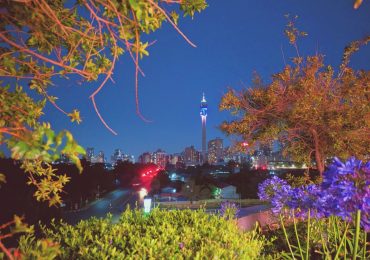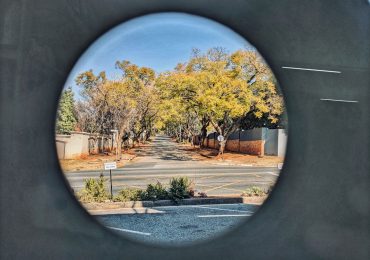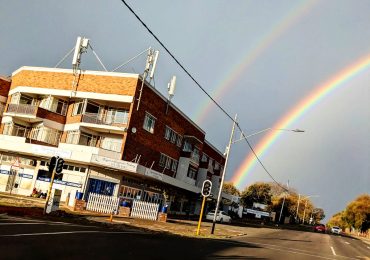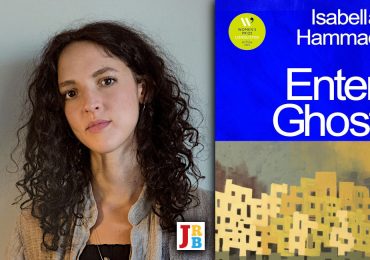Author Siphiwo Mahala gave gave his inaugural postdoctoral address last night at the Market Theatre, Johannesburg, as part of a symposium on the life of the literary icon Can Themba.
Mahala is the author of the novel When A Man Cries (2007), which he translated into isiXhosa as Yakhal’ Indoda (2010), and the short story collection African Delights, which includes ‘The Suit Continued’, a response to Can Themba’s famous story ‘The Suit’. In January 2016, The Guardian listed African Delights as one of the top ten must-read books in the world. He served as the head of books and publishing at the Department of Arts and Culture for over ten years, and is currently a judge of the prestigious 9mobile Prize for Literature (formerly known as the Etisalat Prize).
Mahala’s dramatic debut, The House of Truth, based on the life of Can Themba and starring Sello Maake kaNcube, played to sold-out audiences at the 2016 National Arts Festival in Grahamstown, and then toured the country, selling out wherever it appeared—including at the Market and Soweto theatres in Johannesburg.
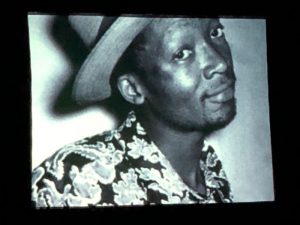
Mahala, whose doctoral thesis centred on Themba, was speaking ahead of the premiere of his documentary on the writer, Can Themba: The Teacher in the Newsroom, which features a host of voices addressing the impact Themba had on their lives. Many of those who appeared on screen are now dead, having joined Themba in the literary pantheon—including Nobel Laureate Nadine Gordimer, Poet Laureate Keorapetse Kgositsile and Professor Mbulelo Mzamane.
Introducing Mahala, Professor KM Masemola of Unisa, who supervised his thesis, remarked on how exceptional his pupil’s journey to his PhD had been: there was the rigorous academic paper, which served almost as a fresh literary biography of Themba, yes—but there was also The House of Truth, and now this, a documentary on Themba that permanently restores the voices of those who knew and loved Themba to the literary archive.
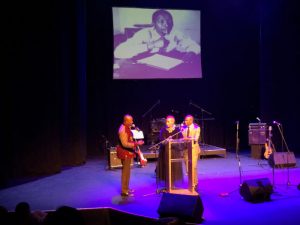
KaNcube directed the evening alongside Zukiswa Vutela. At the beginning of the programme, the latter led the audience in a moment of silence for Themba and the writers and family members who contributed, one way or another, to Mahala’s doctorate. The moment was punctuated by a solo saxophone performance by Sipho Hotstix Mabuse, who later played the evening to its conclusion with Kabomo Vilakazi.

Here follow a few highlights from Mahala’s moving address:
‘“The Suit” is Can Themba’s most famous story, and probably the most successful short story by any South African writer. I don’t know of any story that has been turned into comics, into a play, into a film and a musical, and been successful in all of these genres. Some will remember that in 2002 I wrote a story called “The Suit Continued”, and that story has inspired a dialogue with the fifties. After I published that story, Zukiswa Wanner decided to respond to my “Suit”, as I was responding to Can Themba’s “Suit”. And then Sis’ Khosi Xaba decided to respond to my “Suit”. Then, among other institutions, Stellenbosch University prescribed my book for English third year level, and they assigned students to respond to my “Suit”. So in other words currently we have a whole new generation of scholars who are in dialogue with Can Themba.
‘This is what fascinated me the most about Can Themba, that he remains relevant, he resonates with generations. That epochal kind of writing, the writing that connects generations, is the writing that we should encourage. Unfortunately our media space now has evolved to such an extent that social media is always ahead of us. So the best thing to do is to write stories that will resonate with generations. And that’s the magic of Can Themba, in my view.’
Mahala also acknowledged the encouragement and wisdom provided to him by Keorapetse Kgositsile and Mbulelo Mzamane.
‘This has been a very emotional project for me. The person who really inspired me to take this journey, he is no more. On 3 January this year, we lost Bra Willie Kgositsile. He’s one person who really encouraged me, in all my writing. It was him who gave me insights that I could not read anywhere about Can Themba.
‘Bra Willie, with whom I worked for a period of ten years, we had a special relationship. If anyone has interacted with Bra Willie you would know that he was such a fantastic storyteller. You would ask him to explain one thing, at the present moment, and he’ll draw it back to the thirties and give you the history. And by the end of the day you became a better person. He was someone that has mentored, has enriched, many young people, he’s someone that I would love to be here today, but we have his family, his wife and his daughter are here, so I would like to acknowledge them.’
Mahala said Mzamane, who was the Vice Chancellor of Fort Hare when Mahala studied there as an undergraduate, encouraged him to pursue a PhD on Themba for over ten years.
‘What we have produced is the very first full study on Can Themba. Can Themba passed away exactly fifty-one years ago, and as much as we have celebrated his works over the years, there’s no biography of him, there was no full study, and definitely there was a not a documentary about him. So Mzamane pushed me to be the first to put together that body of work. So when I finally registered for my PhD at Unisa I made sure to let him know. And about three weeks after I had told him I had registered, he passed away.
‘In short, as much as today is about Can Themba, it is really about these legends who have contributed so much to this study.’
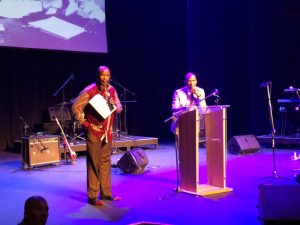
Mahala also thanked his late parents, as well as his elder sisters.
‘This is obviously the celebration of my academic achievement, but we all know that you don’t begin with a PhD, so this is an opportunity for me to thank all those who contributed to my education from the start until now. I’m the last born at home, coming after three girls—all three of my sisters are here. Our parents passed away quite early in life. My mother passed away exactly thirty-two years ago, and because I was very young I don’t have very vivid memories of her. But what I remember about her is that she valued education.
‘In fact, the middle name that has become a favourite of some of you since I shared my certificate on Facebook—McGlory—well, I always thought I was named after some Scottish national, but I found out only recently who I was named after. A certain man called me and told me he had tried to get hold of me for almost ten years after hearing me on a radio station. I agreed to meet this man and he turned out to be as black as me, as black as tar, as Can Themba would put it. Apparently when he was a young man he was promising academically, and he was staying with my parents. My mother was pregnant at the time, and she told him she would name me after him. Over the years this man served time on Robben Island, and was in exile, he came back after democracy, after the dawn of freedom. I meet him three years ago and he is now a professor. To me, meeting him was the affirmation of what I was told about my mother and how much she valued education.
‘My father never really had the opportunity to go to school, but he also valued education more than anything else. On Wednesday, 5 March 1997, when I was at Fort Hare and those of us who could not afford fees were battling to register—The Fees Must Fall movement has been happening from way back—as I was battling my father called me and said “Ufunde, ungabinaxhala” [which loosely translates as “Study, have no fear”]. The following day, 6 March, he passed away. At the time I never knew what he meant, but I know now that this is what he wanted for me.
‘So me getting here was not an easy journey, it involved a lot of sacrifice for a lot of people.’
Mahala closed his address with some thoughts on Themba’s love for teaching, and the current debate around free education.
‘I called this documentary The Teacher in the Newsroom. Can Themba was a teacher by qualification. Those who have seen The House of Truth will know that he was frustrated in teaching and he was even more frustrated in the newsroom. But what is consistent about him is that he taught all the time, he is still teaching us, through his books. Not only that, he established his house, the House of Truth, as a platform for critical engagement. So by organising this symposium we are continuing in the tradition that Can Themba created.
‘Since Can Themba was so passionate about education and imparting knowledge, we need to introspect. A child like me almost didn’t make it through education, because of funds, and I wouldn’t be here. How many in our townships failed to go to university? The poverty cycle continues. So I think education should never have been for sale. And this is one of the challenges I faced as a civil servant. When the Fees Must Fall movement emerged in 2016 and there was a march to the Union Buildings, I couldn’t help myself. I took out my Unisa student card and joined them, because as much as I worked for government they stood for what I stand for.
‘In celebrating Can Themba I think we have to be much more serious about education and much more serious about imparting knowledge. To me that’s the best way we can celebrate Can Themba, as a teacher.’

